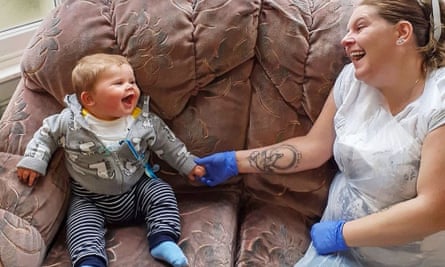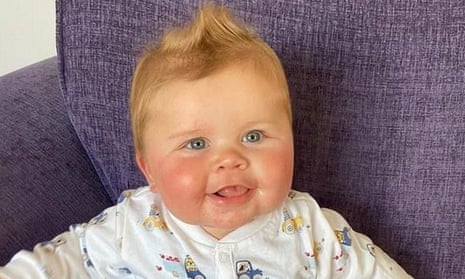Information about drinking, debts and mental health that could have prevented a baby boy being placed with an adopting mother who went on to murder him was not shared between agencies, an investigation has concluded.
It also found that when the mother told social workers she was struggling to bond with the child, not enough support for the family was put in place.
Leiland-James Corkill was taken into care at birth and, at the age of seven months, was placed with Laura and Scott Castle, a couple from Barrow-in-Furness.
Five months later, not long after his first birthday, the baby died as a result of catastrophic head injuries.
Laura Castle was found guilty of murder in May and was jailed for life with a minimum term of 18 years.

Precise details of what happened may never be known. But a trial at Preston crown court heard that Castle lost her temper with the baby when he would not stop crying after breakfast, and violently shook him to death.
In a letter to the trial judge the baby’s birth mother, Laura Corkill, said: “He was placed in the home of a monster.”
Corkill, of Whitehaven, said her son would be alive today if she had been allowed to keep him and she criticised the actions of Cumbria county council.
Speaking to the BBC, she said: “Why did they place him there? Why did it take them so long to pick up on it? They should have cancelled the adoption order.”

The independent report on the boy’s death, published on Thursday, concluded there was relevant information that could have been shared more fully between agencies.
For example, at the time of the adoption assessment, Castle told a therapy service that she was drinking six bottles of wine a week and had issues with low mood, anxiety and anger management. She talked about shouting too much at her biological daughter.
Concern about her drinking was also raised by a consultant gastroenterologist and the information was shared with her GP.
The report says Castle told a social worker she was struggling and was worried she did not love the baby as she had expected to. There should, the report says, have been “a more timely and robust response” to those concerns.
Lesley Walker, an independent scrutineer with Cumbria Safeguarding Children Partnership, said social workers needed to seek out information and not rely on what they were told. They should be “really curious and prepared to challenge in all areas of day-to-day working with children and families”.
John Readman, the executive director for people at Cumbria county council, said the authority was deeply sorry and offered its condolences.
He said the Castles went through an eight-month assessment process and no concerns were raised by anyone in any agency about their suitability.
“What we know now, from the trial and this review, is that Laura Castle deliberately and repeatedly misled and lied to social workers about vitally important aspects of her life, including her mental and physical health, her alcohol use and debts,” Readman said.
“We also know now that relevant information about Laura Castle was not shared between agencies, and that more could have been done to clarify some of the information we were provided with.
“Had the full picture of Laura Castle’s life been known, then the assessment of her suitability as an adopter would have been better able to consider the vulnerabilities and potential risks of approval.”
Readman said he accepted that Castle did tell social workers she was struggling to bond with the baby.
“The report highlights that more should have been put in place to support the family,” he said. “We acknowledge this and have since made changes to how we work.” He added: “I am absolutely committed to ensuring we do all we possibly can to prevent something like this happening again, here or anywhere else.”
Sarah O’Brien, Lancashire and South Cumbria’s chief nursing officer, said the circumstances of Leiland-James’s death would stay with them for a long time.
“Ensuring professionals are openly and proactively sharing information throughout the adoption process is vital, and it saddens and disappoints us that the review has highlighted a number of gaps where this needs to be improved,” O’Brien said.
“Lack of robust information sharing continues to feature in child death reviews nationally and for Leiland-James, information sharing was not good enough throughout the critical stages of the adoptive process. Steps have already been taken locally to address this and a recommendation to change national guidance has also been made.”



